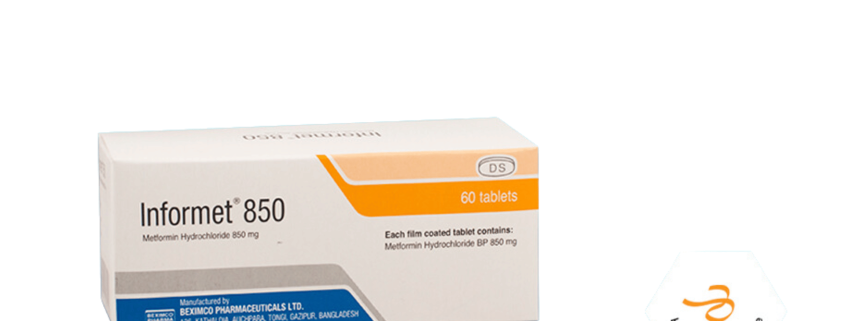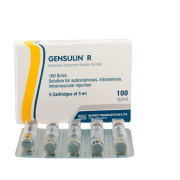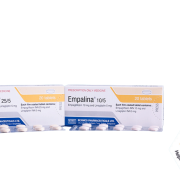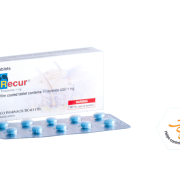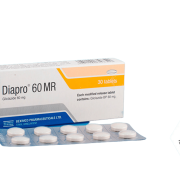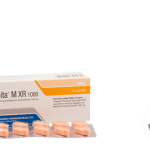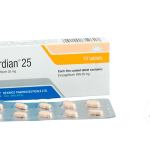Informet
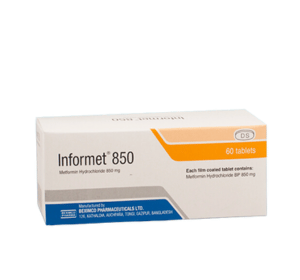
Generic Name: Metformin Hydrochloride
Dosage Form: Tablet
TG Name: Endocrine & Diabetes
1. What Informet & Informet LA is and what it is used for?
Metformin Hydrochloride belongs to a biguanide class of oral antidiabetic drugs. It decreases hepatic glucose production, decreases intestinal absorption of glucose and improves insulin sensitivity. Unlike sulfonylureas, Metformin Hydrochloride does not produce hypoglycemia. It is the drug of first choice in obese patients. Metformin Hydrochloride, as monotherapy, is indicated as an adjunct to diet to lower blood glucose in patients with non-insulin-dependent diabetes mellitus (NIDDM) whose hyperglycemia can not be satisfactorily managed on diet alone. Metformin Hydrochloride may be used concomitantly with a sulfonylurea when diet and Metformin Hydrochloride or sulfonylureas alone do not result in adequate glycemic control.
2. Before you take Informet & Informet LA?
Contraindications
Metformin Hydrochloride is contraindicated in patients with renal disease or renal dysfunction, congestive heart failure, known hypersensitivity, acute or chronic metabolic acidosis, including diabetic ketoacidosis, with or without coma.
Precautions
Metformin Hydrochloride therapy should be temporarily suspended for any surgical procedure (except minor procedures not associated with restricted intake of food and fluids) and should not be restarted until the patient’s oral intake has resumed and renal function has been evaluated as normal. It should be used with caution in case of excessive alcohol intake and hepatic insufficiency. It should be temporarily discontinued in patients undergoing radiologic studies involving intravascular administration of iodinated contrast materials, because use of such products may result in acute alteration of renal function.
Use in special population
Pregnancy: Safety in pregnant women has not been established. Any decision to use this drug should be balanced against the benefits and risks.
Nursing Mothers: It is not known whether Metformin Hydrochloride is secreted in human milk.
Paediatric & Geriatric use: Safety and effectiveness in paediatric patients below 10 years have not been established. Dosage adjustment should be based on a careful assessment of renal function in elderly patients.
Drug Interactions
Nifedipine: Nifedipine appears to enhance the absorption of Metformin Hydrochloride. Metformin Hydrochloride has minimal effects on Nifedipine.
Other: Certain drugs tend to produce hyperglycemia and may lead to loss of glycemic control. These drugs include thiazide and other diuretics, corticosteroids, phenothiazines, thyroid products, estrogens, oral contraceptives, phenytoin, nicotinic acid, sympathomimetics, calcium channel blocking drugs, and isoniazid. When such drugs are administered to a patient receiving Metformin Hydrochloride, the patient should be closely observed to maintain adequate glycemic control.
Overdosage
Hypoglycemia has not been seen even with ingestion of up to 85 g of Metformin Hydrochloride, although lactic acidosis has occurred in such circumstances.
3. How to take Informet & Informet LA?
Informet® 500 tablet: Initial dose is 500 mg tablet 2-3 times daily with or after meals, gradually increased if necessary to 2 to 3 g daily.
Informet® 850 tablet: Initial dose is 850 mg tablet once or twice daily with or after meals, gradually increased if necessary to 2 to 3 g daily.
Informet® LA 500 tablet: The usual starting dose is 500 mg once daily with the evening meal. Dosage increase should be made in increments of 500 mg weekly, up to maximum of 2 g once daily with the evening meal.
Informet® LA 750 tablet: The usual starting dose is 750 mg once daily with the evening meal. Dosage increase should be made in increments of 750 mg weekly, up to maximum of 1500 mg once daily with the evening meal after consulting with doctor.
Informet® LA 1000 tablet: If glycemic control is not achieved, 1000 mg twice daily with evening meal should be considered.
Informet® LA 1000 mg are intended for patients who are already treated with metformin tablets (prolonged or immediate release).
The dose of Informet® LA 1000 mg should be equivalent to the daily dose of metformin tablets (prolonged or immediate release), up to a maximum dose of 2000 mg, given with the evening meal.
Metformin Hydrochloride Long Acting tablets must be swallowed whole and never crushed or chewed.
Combination with insulin: Metformin Hydrochloride and insulin may be used in combination therapy to achieve better glucose control. The usual starting dose is Informet® LA 500 tablet once daily, while insulin dosage is adjusted on the basis of blood glucose measurements.
Elderly: Due to the potential of decreased renal function in elderly patients, the Metformin Hydrochloride dosage should be adjusted based on renal function. Regular assessment of renal function is necessary.
4. Possible side effects
Diarrhoea, nausea, vomiting, abdominal bloating, flatulence, and anorexia are the most common reactions to Metformin Hydrochloride. Lactic acidosis also rarely occurs.
5. How to store Informet & Informet LA?
Keep in a cool & dry place. Keep out of the reach of children.

